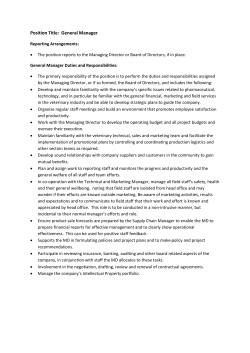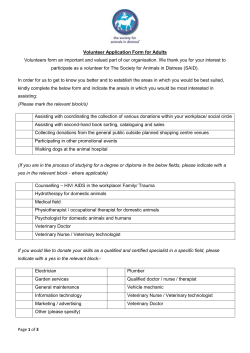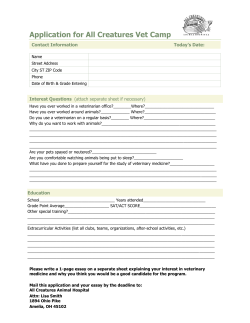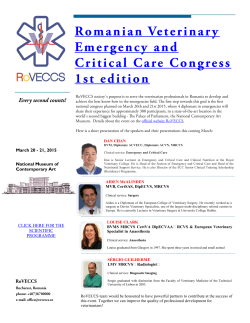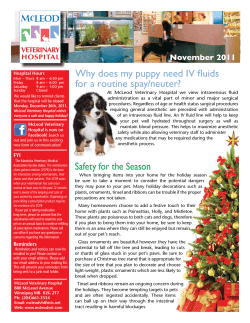
PUPPY PRE-SCHOOL - Haberfield Veterinary Hospital
Dr Tanya Carter Founder of the Haberfield Veterinary Hospital After graduating in Veterinary Science from the University of Sydney, Tanya was engaged in research on marsupials. She has maintained a keen interest in wildlife disease. Tanya is a Member by examination of the Australian and New Zealand College of Veterinary Scientists (in Animal Welfare). Tanya is President of the Australian Veterinary Association’s AVAWE (Australian Veterinarians for Animal Welfare and Ethics), serves on three Animal Ethics Committees and is a past member of the Veterinary Surgeon’s Board. Tanya was a recipient of the Belle Bruce Reid medal awarded to Australia’s top 100 women vets by the University of Melbourne in 2006. She is a published author on veterinary ethics. She has four adult children. Dr Helen Gibson has been with us for many years and is an experienced veterinarian. Mother to three beautiful girls, she is also a practising artist. Helen has a degree in Fine Arts as well as her BVSc. (You can see some of Helen’s artwork on the walls of our waiting room). Helen works regularly on Monday night, on Tuesday and Thursday during the day, and on regular Saturdays and Sundays. Helen enjoys surgery and performs our complex surgery such as cruciate repairs. Dr Betty Liem, a University of Sydney graduate, has a special interest in Feline Immunodeficiency Virus (FIV) and has presented at the Australian College of Veterinary Scientists Science Week and published in the Journal of Veterinary Internal Medicine in 2013. Betty enjoys fishing, skiing, spending time with her beloved feline companion, “Mellow” and often works with us as a casual vet on the weekends. Dr Melody Leung is our other casual vet. Originally from Hong Kong, she has worked in small animal medicine in Hong Kong and Sydney since graduating as a vet from the University of Sydney. An animal lover since childhood, Melody has four adopted cats and has recently adopted an abandoned guinea pig that she nursed back to good health. Dr Jonathon Early was a live-in veterinary student at the HVH in 2003/2004. He has worked in country Victoria, the ACT, Tasmania and the United Kingdom and is currently completing a PhD in behavioural genetics of herding dogs at the University of Sydney. He is a member of the Australian and New Zealand College of Veterinary Scientists in Veterinary Behaviour. www.haberfieldvet.com 53 - 55 Ramsay St. Haberfield 2045 (near corner of Marion St.) Phone: 9798 0785 Phone/Fax: 9799 2258 CONSULTATION HOURS Monday – Friday 9:00 am – 12 noon 5:00 pm – 8:00 pm Saturday – Sunday 9:00 am – 1:00 pm NO APPOINTMENT NECESSARY FOR CONSULTATIONS Appointments are necessary for routine surgery. OFFICE HOURS Monday – Friday 8:00 am – 8:00 pm Saturday – Sunday 8:00 am – 1:00 pm We have 24hr nursing care provided by our live-in staff, a group of senior vet students. ‘Pick ups’ and ‘drop offs’ can be arranged outside office hours. Please call if you require this service. AFTER HOURS EMERGENCIES PHONE 9798 0785 PUPPY PRE-SCHOOL Delta Society accredited dog-trainer, Louise, is running the puppy pre-school on Wednesdays from 7.30 to 8.30 pm. Phone us for details of the next class. Join our fun and effective puppy class. Bookings essential. Please ring to enrol now. ABOUT US The Haberfield Veterinary Hospital is a community based fully equipped veterinary hospital, and our primary concern is animal health and welfare. Some of our services include: • For incapacitated clients, a local pick up and delivery service and house calls for simple procedures that do not require hospitalisation. • Limited boarding facilities, especially for animals requiring medical treatment – remember to book in early for the busy holiday periods! • Contacts for pet minders: we have numbers for animal minders and sometimes our nurses and vet students can help. • Simple pet grooms, (not a full grooming service) designed especially for feisty furry cats and snappy little dogs that may require sedation. • A pensioner discount of 10% off the cost of consultations and surgery. Professional Engagement • • • We are committed to the advancement of veterinary science and are proud to be a major supporter of the Australian Companion Animals’ Health Foundation (ACAHF). The ACAHF gives grants for research on small animal diseases. This vital organisation has made a significant contribution to the level of research that is carried out into the diseases that affect our beloved pets. We support Vets Beyond Borders, an important • organisation that provides veterinary care and seeks to improve animal welfare in the Asia Pacific region. We also support the AVA’s Animal Welfare Trust. University Support Practice • The Haberfield Veterinary Hospital provides the opportunity for final year Veterinary Science students from the University of Sydney to train with us as • interns. American Interns CAPA is an American organization that arranges for American students to travel abroad for a couple of months as part of their studies back home. We are fortunate to have an excellent relationship with them. We were delighted to receive an award from CAPA for hosting students from America and Tanya was invited to a Thanksgiving lunch. It was good to see so many young American students enjoying the opportunity to study and work in Australia. The HVH has been hosting students for some years now and many keep in touch. It's very pleasing to see that a number have become vets. We welcomed two new CAPA students Cale and Ronni last month. Cale has finished his stint with us and has returned home whilst we have the pleasure of having Ronni with us for a bit longer. FLEAS! Autumn is the peak period of the year for fleas and therefore for flea allergies! Fleas are the most common cause of itchy dogs and flea allergy can cause miliary dermatitis in cats. There are a number of products on the market and sometimes animals need treatment every 2 – 3 weeks instead of 4. As spot-‐on products spread over the skin it is important to follow the directions with regard to washing and as cats are important flea carriers all cats in a household should be treated at the same time. Call us for advice. STAFF & NEWS Megan, a full time nurse with a degree in environmental science has finished her vet nursing studies at TAFE. Megan worked at the zoo before she joined us. She has a particular expertise with wildlife. Sisters Rachael and Sam job-share the other full-time vet nurse position. Local girls, they have a long association with the veterinary hospital and both are studying vet nursing at TAFE this year. Francisca is a casual vet nurse. RESIDENT VETERINARY STUDENTS Our resident vet students allow us to provide 24 hour nursing care. All our students work as casual nurses at the practice when needed. Kayla who comes from the Gold Coast has another year with us. We also have Jess from the USA and Phil from Glenhaven. I would like a pet. What laws should I be aware of? Australia has one of the highest rates of pet ownership in the world. To ensure the safety and wellbeing of the whole community, the Companion Animals Act regulates the responsible ownership of companion animals in New South Wales. The Act sets down the following main requirements for pet owners: Dogs and cats must be implanted with a microchip from the time they are 12 weeks of age, at the point of sale or change of ownership (whichever occurs first) and must be registered with the local Council by 6 months of age. • Dog owners must take all responsible precautions to prevent the dog from escaping from the property in which it is being kept. For the purposes of this requirement, “owner” includes any person who is for the time being in charge of the dog. Cats are prohibited from food preparation and consumption areas, and from all wildlife protection areas. • Dogs, with the exception of assistance animals, are prohibited from the following areas (whether or not they are leashed or otherwise controlled): a. children’s play areas; b. food preparation/consumption areas, although it should be noted that recent amendments to the Cat now permit pet owners to take their pets to outdoor cafes provided that the café owner allows this, the animal is restrained (unless it is a designated off leash area), remains on the ground in the outdoor area at all times and is not fed. c. Recreation areas where dogs are expressly prohibited; d. Public bathing areas where dogs are expressly prohibited; e. School grounds, child care centres; f. Shopping areas where dogs are expressly prohibited; g. Wildlife protection areas where dogs are expressly prohibited. • When in public places, dogs must wear collars identifying the dog’s name and address or phone number of the dog’s owner. The animal must also be attached to an adequate chain, cord or leash but is exempt if being exhibited at a show, engaging in obedience trials, secured in a cage or vehicle, or is in an approved off-leash area. • Greyhounds must at all times have a muzzle securely fixed when in a public place. There are also specific requirements regarding dangerous and restricted dogs in public. • Dog owners must pick up and dispose of dog faeces immediately. • No person may have more than four dogs under his/her control at any time in a public area.
© Copyright 2025
